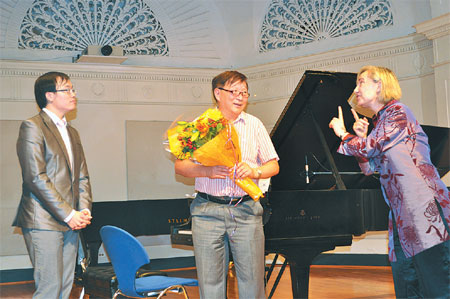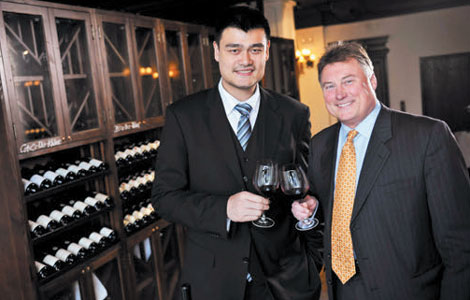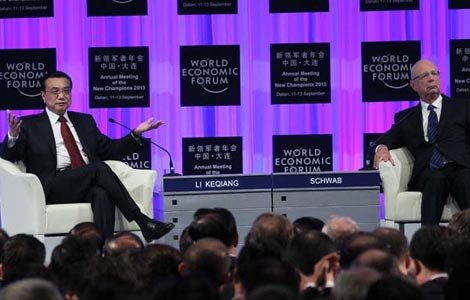Saluting a living legend: modern piano composer Wang Jianzhong
Updated: 2013-09-13 11:44
By Liu Lian in New York (China Daily)
|
||||||||
|
Wang Jianzhong (center) and Tang Diyi (left) are greeted by Pavlina Dokovska, chair of the department of piano at the Mannes College of Music in New York, after Wang's lecture. Liu Lian / China Daily |
"Nationalism, music for the People, and revolutionary in nature," said Wang Jianzhong, referring to the three principles of music composition during the "cultural revolution" (1966-76).
Wang, an influential Chinese composer and music teacher, gave a lecture on his piano works on Tuesday at the Mannes College of Music in New York. More than 100 of Wang's students and admirers attended the event which also celebrated the composer's 80th birthday.
The former vice-president of the Shanghai Conservatory, Wang is a household name in China thanks to his large body of works for piano composed in 1960s and 1970s, music that bridged traditional Chinese music with Western classical and modern composition styles.
His piano compositions, including "Liuyan River," "Three Variations of the Plum Blossom Melody," and "Sakura" among others, have become standard concert repertoire of such renowned performers as Tan Dun and Lang Lang.
Wang started the lecture with an overview of the music scene in China during the "cultural revolution". "There were clearly rules about what we should do and what we were not supposed to do," said Wang. Artistic creation and production had to be tuned to inspiring common people towards revolutionary ideologies, and most contemporary and Western music was banned, he said.
The constraints on music themes fed Wang's passion for transcribing music for traditional Chinese instruments such as the qin (a Chinese stringed musical instrument) and folk songs into piano versions.
Versed in English, Wang was trained at the department of composition and then the department of piano with a focus on Western classic music at Shanghai Conservatory before getting tenure at the school in the 1950s. He now lives in Shanghai.
His piano compositions were valued for what they revealed about the dilemma faced by Wang's generation of Chinese composers during a time of great social turmoil. The popularity of his works continued after the bans on contemporary music and Western music were lifted in the 1970s, said Wang.
"Young people sometimes may prefer to play the 'old music' over the contemporary pieces," said Wang. "The role of elements of Chinese traditional music or 'nationalism' played in the popularity of my repertory is, perhaps, not to be neglected."
"There were two kinds of traditional Chinese music - the one of the intellectuals and the one sung by the peasants; the sophisticated and refined versus the rustic and bold," said Wang, comparing the differences in music styles between "Three Variations of the Plum Blossom Melody" and "Hundreds of Birds Worshipping the Phoenix".
Whereas "Three Variations," an original qin piece, was rendered with delicacy and a light and airy timbre to "the extent of transparency in mimicking the humming of nature," said Wang, "Hundreds of Birds" was "festive and noisy." The sharp contrast between suona (a Chinese trumpet) and sheng (a Chinese mini-organ with pipes) was played out with heavy thumps and striking chords, spattered with chirping sound of birds, reinforcing the vibrant and bright color of the folk song.
The night's program included "Liu Yang River" (1972), "Three Variations of the Plum Blossom Melody" (1973), "Hundreds of Birds Worshipping the Phoenix" (1973), and "Evening Song on the Fishing Boat" (2006) and demonstrations on the piano by Tang Diyi, top prize winner of the 2013 Russian Music International Piano Competition and the 2013 Virginia Waring International Piano Competition and Judy Yeh, a music teacher at the New York Chinese Music and Culture Center, on the qin.
lianliu@chinadailyusa.com
(China Daily USA 09/13/2013 page7)
Most Viewed
Editor's Picks

|

|

|

|

|

|
Today's Top News
China's ICBC set to expand in Canada
Florida college joins push for ties with China
China supports trade ties: Michigan governor
Markets hold breath over Chinese cotton policy
Economist calls for global Marshall Plan
'Green Fence' puts pressure on US recyclables
One in four men in Asia-Pacific admit to rape
WB head to discuss climate in China visit
US Weekly

|

|














